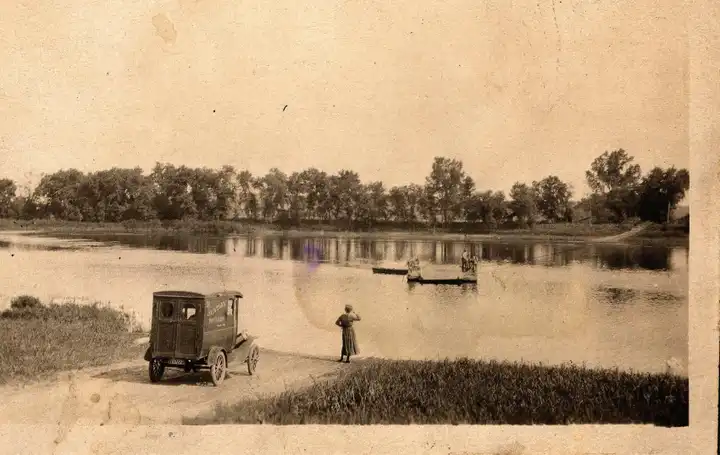
4 minute read
CarryvilleFerrypassenger
think we should stick our necks out.”
Long after midnight in June 1954, the Alfs were awakened by a far different sort of traveler. Paying little attention to the “This Ferry Operates From 6 am to 12 Midnight” sign, a California man and his passenger laid on their horn and demanded to be taken across the river at around 2am. As Jim tells it, the driver reeked of alcohol. Bill Alf was so incensed by the early morning wakeup that he said, “Mister, this is going to cost you a buck!”
Advertisement
“You can take your buck and you know what you can do with it!” the man hollered back.

Unaware that the ferry had left the shore, the man put his car in reverse and squealed off – directly into the river. Soaking wet, the men waded from the car and sobered up by way of a nap in a nearby haystack.



As Jim recounts in When The Ferries Still Ran – his comprehensive account of ferry life in the Chippewa Valley – the men were approached by Menomonie Sheriff Clarence Walters the following morning.




Since the men were no longer drunk, no charges could be filed.
“But there is one thing I can do,” Sheriff Walters told Bill Alf, “I know the most expensive towing service in Menomonie and that’s the one I’m sending down.”
These days, Jim no longer spends his golden hour fishing off the ferry. Instead, he enjoys breakfast at the assisted living facility with a friend who himself rode the ferry as a boy.
Plenty of others recall their own trips on the Caryville ferry. While the weekday clientele mostly soda fountain.
On Saturday nights, it was not uncommon for young men to ride the ferry to court their love interests on the other side of the river. The young men usually returned home on the midnight ferry – he last crossing of the night.
Mindful of the young suitors’ occasional inability to keep track of time, Bill Alf and his sons would try to keep tabs on who would require a return ferry.
“Sometimes we’d stay up a few minutes late,” Jim says, “to make sure we got the boy home.”
•••
Mornings on the river, Jim was often joined by a great blue heron whose fishing prowess put Jim and his lures to shame. The heron nabbed frogs and fish all summer long, returning to the landing year after year. Jim also received regular visits from rabbits, squirrels, and the occasional beaver – though all these visits paled compared to his human guests. Occasionally, reporters from Minneapolis, Milwaukee, and Madison dropped by for a lift and left with a story. The accumulation of stories attracted more riders and provided Jim even more opportunities to strike up conversations with
One day Jim ferried a championship fisherman across the river. (“If you toss a matchstick on the river, I’ll cast a bait and land right on it,” the fisherman boasted.) Another day, he ferried a man who’d caught a northern pike, whose glistening scales stretched the entire length of the backseat of the man’s car. (“He was pretty proud of that.”) ences were mostly limited to the reach of the river. the Chippewa River near Caryville. Plans for such a bridge began in 1886, though for 80 years, the project was plagued with an array of bureaucratic stumbling blocks. But at last it was done, and to commemorate the occasion, a band played, dignitaries gave speeches, and a young boy christened the bridge with a bottle of soda pop. Dunn county residents were elated, except for Bill Alf, who knew he was out of a job. It was the third time in his career that a technological advancement had left him looking for work.
L.G. Arnold, the contractor, hailed the bridge as “a turning point in the development of this area.” But he added, too, “I’m sorry to see the old ferry go, God bless her, but we must make way for the new.”
Bill Alf’s last passenger was Marv Huseby and his horse and wagon team. They floated beneath the bridge just as the ribbon-cutting ceremony got underway. After the final words were spoken, the residents retreated to a complimentary luncheon courtesy of Spring Brook and Rock Creek Lutheran churches. But not everyone attended. As the Leader-Telegram reported, “Bill Alf left his ferry on the north side of the river and walked across the new bridge to his home on the south side of the river, ready to adjust to another kind of life.”
They are a promise of continuity. And a reminder, too, that while everything has its beginning and end, we’d be foolhardy to overlook the meandering middle.


Between the ages of 12 and 18, Jim Alf – one of Caryville’s last ferry drivers – transported an estimated 100,000 passengers from one side of the river to the other. It is a stunning accomplishment, particularly given that the total population of Dunn County in 1950 was just over 27,000.


When I ask Jim what makes rivers so special, he pauses before settling on an answer.
“I think rivers excite all five of our senses,” he says.
I run through his theory aloud. “You see it, hear it, taste it, feel it …”
“And smell it,” Jim says. “And rivers have a unique odor. An essence,” he continues. “It’s kind of a sagey, nutty smell. It smells a little of water, but mostly it’s the smell of the plant life around it. The rotting weeds.”




It’s a smell that – even in his memory – transports him back to those golden hour mornings from long ago. Back to a time and place all-but-forgotten today.
But thanks to Jim, not quite.
B.J. Hollars is the author of several books, most recently Go West Young Man: A Father and Son Rediscover America on the Oregon Trail. He is an associate professor of English at UWEau Claire. His website is bjhollars.com.
After graduating from high school in 1955, Jim joined the Air Force, attending basic training in Oakland, California. For a young man who’d never ventured past Duluth, the West Coast opened his eyes to a host of new experiences, and new people.
Are you doing all you can to assure that your finances are in order? Do you need some help learning tips on safe money-handling to rest assured, knowing you’re financially in the right spot? Well, most of us need a little help in that area, so we talked to local finance experts and they’ve agreed to share some knowledge. Use their smarts and a little bit of your own to get your money lined up so you can breathe easy and spend wisely. presented by










